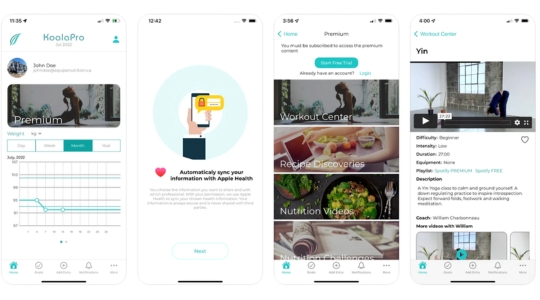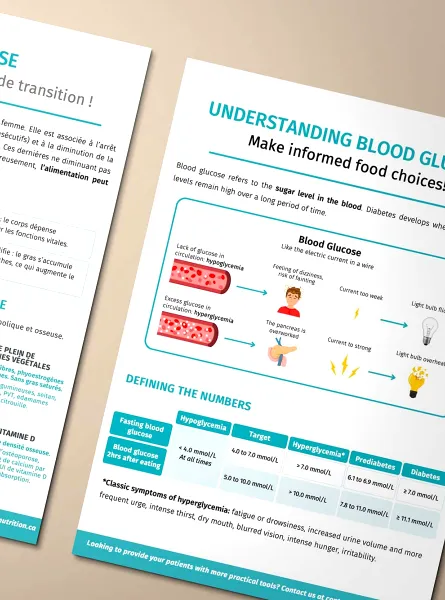
What are the benefits of effectively referring key patients to clinical dietitians? How can we facilitate this referral and thus increase interprofessional collaboration within the health care system? Here's what you need to know about referring patients for optimal nutritional management.
Why Choose to Work With a Registered Dietitian?
In Canada, registered dietitians and nutritionists are the recognized experts in food and nutrition. Effective interprofessional collaboration allows for more comprehensive care, in keeping with the respective expertise of the treating professionals. The versatility of the clinical nutritionist allows her to provide beneficial intervention in many areas, including weight management, chronic diseases, digestive disorders and eating disorders.
Weight management is a common reason why patients are referred for nutrition counseling. Of the growing number of possible nutritional interventions to date, none has been found to be more beneficial than another, with long-term adherence being the most favourable option (1). Several meta-analyses and systematic reviews have shown that personalized management by a registered dietitian increases the amount of weight lost, compared to the simple use of handouts or general recommendations (2, 3).
Presence in the Public and Private Sectors
Dietitian services are increasingly covered by private insurance plans. Redirection of key patients to the private sector relieves the burden on the public health care system, which can then focus on more acute and complex care that usually requires close monitoring by a multidisciplinary team. This is particularly true for cases of malnutrition, dysphagia or parenteral nutritional support, which are fully covered by the public network.
Redirection to the private sector also offers the possibility of a closer follow-up, particularly in order to compensate for the lack of motivation often encountered. More frequent follow-up allows professionals to have more time to integrate motivational interviewing techniques into their care (4). Some patients benefit from longer-term follow-up to adopt sustainable healthy habits. This is particularly true for patients who want to lose weight or make lasting lifestyle changes in the context of chronic disease management, as well as those who require support for eating disorders (mild to moderate ED).
The same is true for cases of digestive disorders that may require rapid management to alleviate symptoms, such as irritable bowel syndrome. Given that the prevalence of the disease is constantly increasing (5) and that waiting times to see a dietitian/nutritionist in the public sector are getting longer, a referral in the private sector may be a wise choice.
Tools to Simplify Interprofessional Collaboration
It is possible to integrate nutrition referral forms into the electronic medical record (EMR). This facilitates referrals to clinical dietitians, while ensuring a continuum of information. In addition, an electronic charting system is now available free of charge to all nutritionists and dietitians in Canada, allowing them to transmit abbreviated nutritional assessments by fax or email to the treating professional. The transfer of relevant information is thus facilitated in both directions.
Collaboration with the patient is just as important, and there are more and more mobile applications that allow the tracking of health data and the sharing of information with the treating professional. These include applications that transmit data from continuous glucose monitors such as Freestyle and Dexcom. Weight and certain biochemical parameters can also be tracked with the KoalaPro app, a Canadian innovation offering the possibility of linking patient information directly to the nutritionist's file.
Beyond the exchange of information between the patient and his or her treating professional, the use of technological tools can be beneficial in the management of obesity (6).
With KoalaPro, follow your weight, your fat percentage and your heart health indicators. Easily share your health indicators from in real time to your health professional only.

The Advantages of an Effective Referral
Whether the referral is made in the private or public network, individualized management by a registered dietitian has its advantages. To date, the literature supports the view that frequent nutritional support can lead to substantial changes in eating habits and that simply stating the recommendations is not sufficient to encourage change (7). That said, the expertise and versatility of clinical nutritionists are not limited to treatment, and preventive care, particularly for chronic diseases, has also been proven (8). Efficient and systematic referral in certain cases therefore allows for close accompaniment and comprehensive management of patients to promote changes in eating habits.
Thus, interprofessional collaboration and effective referral to clinical dietitians offer patients the opportunity to receive more comprehensive care, in accordance with the respective expertise of each treating professional. The facilitated transfer of information allows patients to take full advantage of the expertise and versatility of the nutritionists in a simple and quick manner.
Interested in Collaborating with a Team of Dietitians and Nutritionists?
Would you like to optimize your referral in nutrition, obtain access to the electronic charting system or receive more information?
Contact us! Our team of nutrition experts will be happy to discuss your needs.
Sources:
Johnston, B. C., Kanters, S., Bandayrel, K., Wu, P., Naji, F., Siemieniuk, R. A., ... & Mills, E. J. (2014). Comparison of weight loss among named diet programs in overweight and obese adults: a meta-analysis. Jama, 312(9), 923-933.
Williams, L. T., Barnes, K., Ball, L., Ross, L. J., Sladdin, I., & Mitchell, L. J. (2019, February). How effective are dietitians in weight management? A systematic review and meta-analysis of randomized controlled trials. In Healthcare (Vol. 7, No. 1, p. 20). MDPI.
Wharton, S., Lau, D. C., Vallis, M., Sharma, A. M., Biertho, L., Campbell-Scherer, D., ... & Wicklum, S. (2020). Obesity in adults: a clinical practice guideline. Cmaj, 192(31), E875-E891.
Armstrong, M. J., Mottershead, T. A., Ronksley, P. E., Sigal, R. J., Campbell, T. S., & Hemmelgarn, B. R. (2011). Motivational interviewing to improve weight loss in overweight and/or obese patients: a systematic review and meta‐analysis of randomized controlled trials. Obesity reviews, 12(9), 709-723.
Oka, P., Parr, H., Barberio, B., Black, C. J., Savarino, E. V., & Ford, A. C. (2020). Global prevalence of irritable bowel syndrome according to Rome III or IV criteria: a systematic review and meta-analysis. The Lancet Gastroenterology & hepatology, 5(10), 908-917.
Tytus, R., Divalentino, D. et Naji, L.. Canadian Adult Obesity Clinical Practice Guidelines: Emerging Technologies and Virtual Medicine in Obesity Management . Disponible: https://obesitycanada.ca/guidelines/technologies/. Consulté le 28 septembre 2022.
Chapman, K. (2010). Can people make healthy changes to their diet and maintain them in the long term? A review of the evidence. Appetite, 54(3), 433-441.
Lindström, J., Peltonen, M., Eriksson, J. G., Ilanne-Parikka, P., Aunola, S., Keinänen-Kiukaanniemi, S., ... & Tuomilehto, J. (2013). Improved lifestyle and decreased diabetes risk over 13 years: long-term follow-up of the randomised Finnish Diabetes Prevention Study (DPS). Diabetologia, 56(2), 284-293





